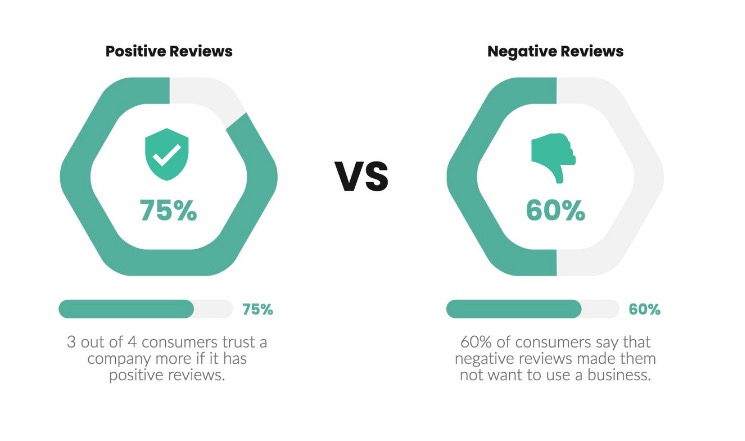2025 Online Reputation Management Statistics
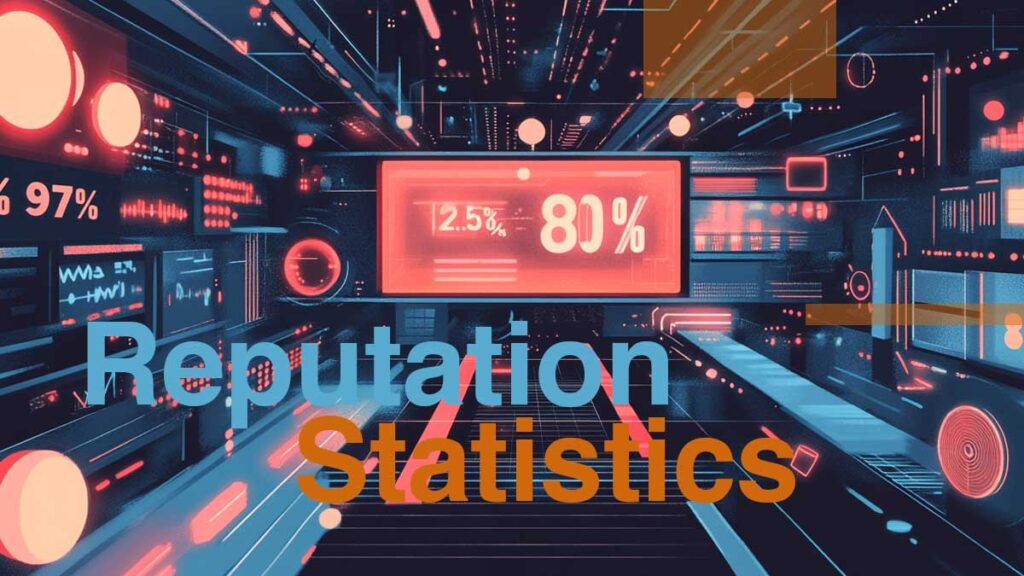
Jump to Section
Recruiting & Employment Statistics
Search Engine Statistics
Now more than ever, people search online to find information and formulate opinions on people and businesses.
Since people are constantly googling your name and your business’s name or queries like “best breakfast near me,” SEO is a key focus point of many reputation management campaigns. In light of the Internet’s power to make or break your reputation, here are some of the most significant SEO reputation management statistics.
From 2015 to 2023, Google’s market share in desktop search engines consistently led, averaging around 88%. Bing saw an increase, peaking at 8.61% in 2023. DuckDuckGo and Yandex also grew, reaching 0.72% and 1.87%, respectively, reflecting a trend toward more diverse search engine usage.
The #1 result in Google gets 27.6% of all clicks
The top Google search result garners a 27.6% click-through rate, with recent 2025 data showing that organic search results overall capture about 40% of total clicks, down from higher percentages in previous years. The tenth position drops significantly to 2.3%. [SparkToro, March 2025]
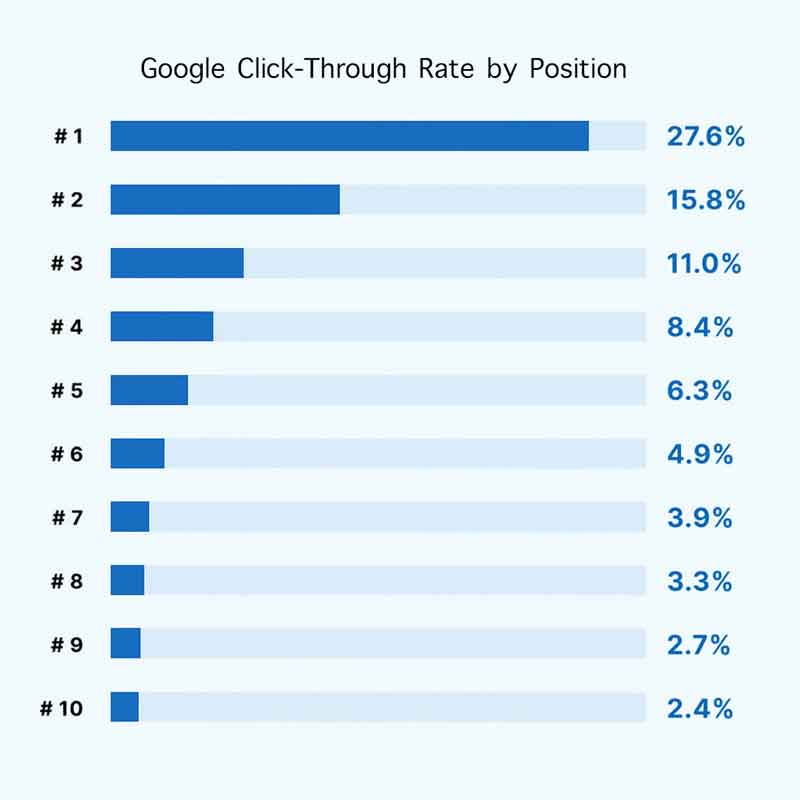
This dominance indicates that appearing at the top of search results can significantly enhance a website’s traffic, as most people only click on the first few listings they see.
For businesses and content creators, securing the top spot in Google’s rankings is not just a matter of prestige but a crucial driver of digital success.
Only 5% of people look past the first page of Google, so first impressions are even more important online than in real life. Miss your chance to make a positive impact, and you may never get another opportunity.
A page that ranks number one on Google generally gets 31.7 percent of the traffic
The ideal for any business is to be number one on Google. If you’re not there, then it means you’re missing out on clicks because traffic dwindles the further down you are in search results. Not showing up for the keywords and searches that matter the most could be costing you business.
According to Backlinko, a page that ranks number one on Google generally gets 31.7 percent of the traffic, while a page that ranks 10th will get just 3 percent of the traffic.
As you can see, the #1 result in Google has a 10x higher click-through rate compared to the #10 result. Most people instinctively click the first search result in Google. Here are the stats:
Google holds 89.62% of global search engine market share as of March 2025
Google holds 79.1% of global search engine market share as of March 2025, though this represents a decline from previous years when Google’s dominance exceeded 90%. This shift reflects the evolving search landscape and the emergence of alternative search platforms and artificial intelligence, making multi-platform reputation management increasingly important for businesses. [Statista, March 2025]
Bing continues to hold the second position with approximately 10.51% of the search engine market share, while other search engines like DuckDuckGo and Yandex maintain smaller but growing user bases.
Mobile Search Behavior and Local Search Trends
Mobile search behavior has evolved significantly, with 82% of U.S. shoppers now using “near me” searches on their mobile devices. Remarkably, 76% of these “near me” searches result in a business visit within a day, and 88% of smartphone local searches lead to a store visit within a week. [Uberall, December 2024]
This data underscores the critical importance of local SEO and mobile optimization for reputation management strategies, as mobile searches often lead to immediate business actions.
Voice Search and Conversational Commerce
Voice search has become a significant factor in reputation management, with 20.5% of people worldwide using voice search as of 2025. Over 50% of the global population uses voice search daily, and 80% of voice searches are now conversational in nature. Importantly for businesses, 28% of consumers call the businesses they voice searched for, making voice search optimization crucial for reputation management. [DemandSage, May 2025] [Synup, January 2025]
This trend toward conversational search queries requires businesses to optimize their content for natural language patterns and question-based searches.
The two most important factors used by Google to determine search rankings are high-quality content and link-building
The two most important factors Google uses to determine search rankings in 2025 are:
Backlinks (Quality and Quantity)
Backlinks remain a foundational ranking factor. They act as votes of confidence from other websites, signaling authority and trustworthiness. While backlinks have slightly diminished in relative importance compared to content quality, they still play a crucial role in boosting rankings. High-quality backlinks from authoritative sites help improve domain authority and search visibility.
High-Quality Content
Google prioritizes content that truly satisfies the search intent of its users. This means content must be relevant, informative, comprehensive, and consistently published. Studies show that consistently publishing high-quality content is the #1 ranking factor, accounting for roughly 23% of the ranking weight. Google’s AI evaluates how well content meets user needs and rewards pages that keep visitors engaged and satisfied.
“Best” and “right now” mobile queries have grown by over 125% in the last two years
People are searching for “best of” lists, and your content marketing plan should reflect that. Mobile queries for “best” and “right now” have grown by over 125% in the last two years. Think of how many times you’ve searched for something like “best cell phone out right now” or “best credit cards to apply for right now.” A lot, right?
71% of Bing users are 35 years old or older.
Contrary to the stereotype of younger users dominating search engines, a whopping 71% of Bing’s user base is comprised of individuals aged 35 years and older.
The view search engines reflect of the Internet is simply a reflection of human bias
Although mistrust towards media and institutions is at an all-time low, general trust in what we see in Google is at an all-time high. Convenience and speed, it would seem, are the arbiters of trustworthiness.
Do Google Auto-Complete results affect brand reputation?

Reputation integrity goes beyond if and how you’re seen on the search engine results page. Something far less overt holds sway: Google autocomplete. Autocomplete responses populated in Google’s search can give new customers pause or inspire them to learn more about your brand.
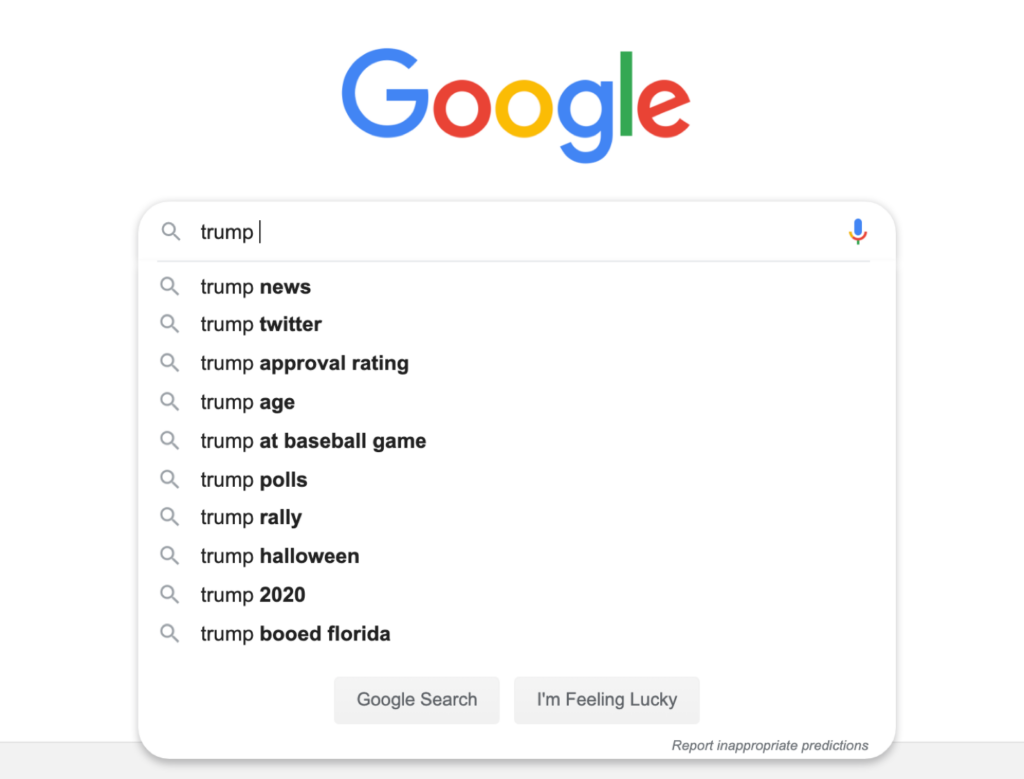
Autocomplete responses can even start to hurt you after just the first word. Just look at what happens when you simply type “Trump” into Google.
So even if you were planning to search something along the lines of “Trump is amazing,” you will see the autofill results above, and maybe click on “Trump booed Florida.” Then you’ll see this:

Wow. Looks pretty bad. This is just one example of the importance of your online reputation. Your Google search results can change people’s opinions of your brand, starting before they even finish typing their search phrases.
While you can certainly Google yourself to find out what your search results look like (and we do recommend doing so as a first step), developing a targeted reputation management strategy to keep tabs on your reputation as it changes over time is much more effective. There are both free and paid tools to help you manage this.
It’s important to think (and search) like your customers would to determine what your online presence is saying about you. Remember that online reputation management best practices are founded on the principles of online human behavior and the tactics of search engine optimization and content marketing.
The major player in the SEO world still stands even with all of the AI competition out there — Google. When optimizing your brand’s reputation, understanding Google’s algorithmic principles is important, but understanding human behavior is even more important.
81% of marketers view content as a core business strategy
Content has firmly established itself as more than just a tool—it’s the foundation of a winning marketing strategy. With 81% of marketers viewing content as a core component of their business approach, it’s clear that content isn’t just important; it’s essential.
Content is the key to engaging with your audience in a meaningful way. Quality content doesn’t just push products; it tells a story, solves problems, and creates connections. In a world where consumers are bombarded with information, content is what helps your brand stand out and resonate.
Review Management Statistics
Online reviews are the digital equivalent of word-of-mouth recommendations, and they carry significant weight in consumer decision-making. Understanding review statistics is crucial for effective reputation management.
85% of consumers trust online reviews as much as personal recommendations
This statistic highlights the incredible power of online reviews in shaping consumer behavior. When 85% of consumers place the same level of trust in online reviews as they do in personal recommendations from friends and family, it becomes clear that managing your online review presence is not optional—it’s essential.
92% of users will only visit businesses with 4+ star ratings
The bar for acceptable ratings has risen significantly. With 92% of users requiring at least a four-star rating before they’ll even consider visiting a business, maintaining high review scores has become critical for customer acquisition. One negative review can cost a business up to 30 customers, making proactive review management essential for business success. [ExplodingTopics, June 2025]
AI Impact on Reviews and Reputation Management
The emergence of AI has significantly impacted online reviews and reputation management. The FTC banned fake and AI-generated reviews in August 2024, responding to a 758% increase in AI-generated reviews on major platforms from 2020-2024. Consumers now invest more cognitive effort when reading AI-generated review summaries compared to human-generated ones, indicating growing awareness of AI content. [Sidley, August 2024] [Originality.ai, April 2025]
This regulatory change and consumer awareness shift means businesses must focus on authentic review generation and be transparent about their review collection processes.
Generation Z Review Behavior Patterns
Generation Z exhibits distinct review behavior patterns that businesses must understand. 87% of 18-24 year-olds are influenced by online reviews compared to 67% of the general population. Additionally, 53% of Gen Z made purchases based on review videos in 2024, and 80% trust online reviews as much as personal recommendations. [eMarketer, February 2025] [Statista, March 2025]
This data suggests that businesses targeting younger demographics should prioritize video reviews and visual content in their reputation management strategies.
Nearly 3 out of 4 consumers trust a company more if it has positive reviews
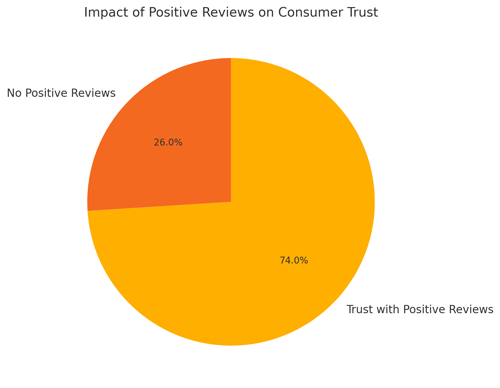
Trust is the foundation of customer relationships, and positive reviews serve as powerful trust signals. When nearly 75% of consumers report increased trust based on positive reviews, the business case for active review management becomes undeniable.
60% of consumers say that negative reviews made them not want to use a business
The flip side of positive reviews is equally important to understand. With 60% of consumers being deterred by negative reviews, businesses must have strategies in place not just to generate positive reviews, but to address and mitigate negative feedback when it occurs.
88% of consumers would use a business that replies to all of its reviews
Response rates matter significantly in review management. The contrast is stark: 88% of consumers would use a business that replies to all reviews, compared to just 47% who would use a business that doesn’t respond to reviews at all. This 41-percentage-point difference underscores the importance of active review engagement.
Social media response expectations have intensified, with 63% of social media users now expecting a brand response within one hour. This expectation for rapid response extends beyond social media to review platforms as well. [Forbes, July 2024]
49% of consumers need at least a four-star rating before using a business
While this statistic might seem to contradict the earlier 92% figure, it represents different aspects of consumer behavior. The 49% represents the minimum threshold for consideration, while the 92% represents the preferred standard for actual visits.
Consumers read an average of 7 reviews before trusting a business
The consumer research process is thorough. With consumers reading an average of seven reviews before making trust decisions, businesses need sufficient review volume to provide adequate social proof. This also means that the quality and authenticity of those seven reviews are crucial.
97% of consumers search online for local businesses
The ubiquity of online research for local businesses cannot be overstated. With 97% of consumers conducting online searches for local businesses, and 12% doing so daily, local reputation management has become a daily necessity rather than a periodic concern.
Every additional one-star Yelp rating causes an increase in the business’s revenue as high as 9%

The financial impact of reviews is measurable and significant. Each additional star in a Yelp rating can increase revenue by up to 9%, providing a clear ROI calculation for review management investments.
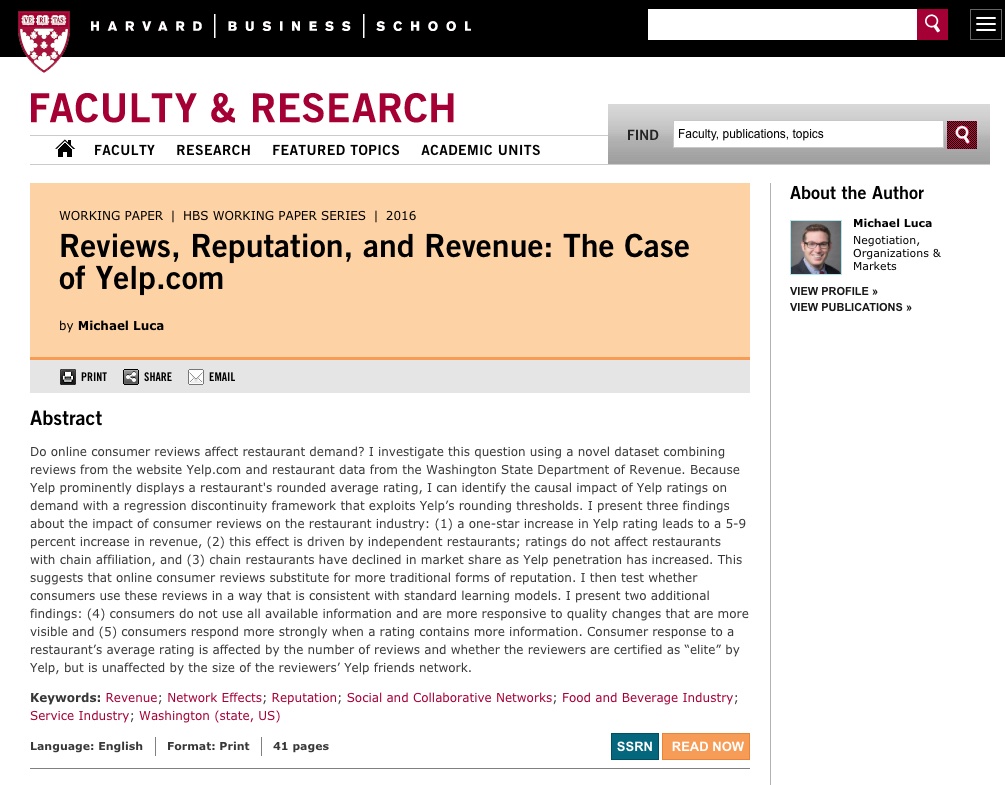
Reviews that only gave 1 or 2 stars failed to convert 86% of prospective customers
Low-star reviews have devastating conversion impacts. When 86% of prospective customers are deterred by 1-2 star reviews, the cost of poor review management becomes immediately apparent.
Americans report telling more people about poor service than good experiences
The negativity bias in word-of-mouth marketing is real and measurable. Americans tell an average of 15 people about poor service experiences compared to only 11 people about good experiences. This 4-person difference in sharing behavior amplifies the impact of negative experiences.
45% of consumers are more likely to visit a business if it responds to negative reviews
Negative review responses can actually become positive reputation signals. When 45% of consumers are more likely to visit a business that responds to negative reviews, it demonstrates that how you handle criticism can be as important as the criticism itself.
Wikipedia Statistics
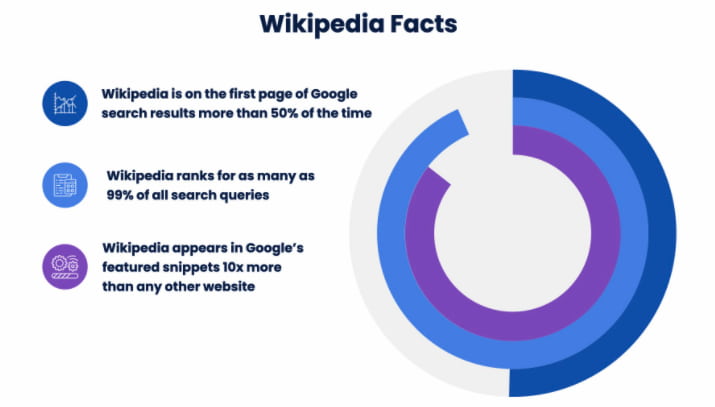
Wikipedia’s influence on online reputation cannot be understated. As one of the most trusted and visible sources of information online, Wikipedia entries significantly impact how individuals and organizations are perceived.
Wikipedia is on the first page of Google search results more than 50% of the time
The visibility of Wikipedia in search results makes it a critical component of reputation management. When Wikipedia appears on the first page of Google results more than half the time, controlling or influencing your Wikipedia presence becomes essential for comprehensive reputation management.
Wikipedia ranks for as many as 99% of all search queries
The comprehensive nature of Wikipedia’s search presence is staggering. With Wikipedia ranking for up to 99% of all search queries, it’s virtually impossible to avoid Wikipedia’s influence on your online reputation.
Wikipedia appears in Google’s featured snippets 10 times more than any other website
Featured snippets represent the most prominent search result placement, and Wikipedia’s dominance in this space is overwhelming. Appearing in featured snippets 10 times more than any other website gives Wikipedia unprecedented influence over first impressions in search results.
Wikipedia articles have an accuracy rate of 80 percent compared with 95-96 percent accuracy within the other sources
While Wikipedia’s accuracy rate of 80% is lower than traditional sources (95-96%), its accessibility and visibility often make it the de facto source of information for many users, regardless of its relative accuracy.
Only 15% of Wikipedia contributors worldwide are women
The gender imbalance in Wikipedia editing creates potential bias in how topics are covered and prioritized. This demographic skew can impact how different subjects and perspectives are represented on the platform.
77% of all edits are done by 1% of Wikipedia editors
The concentration of editing power among a small group of contributors means that building relationships with active Wikipedia editors can be disproportionately valuable for reputation management efforts.
Recruiting and Employment Statistics
Online reputation significantly impacts employment opportunities, both for job seekers and employers. These statistics reveal the extent to which digital presence influences hiring decisions.
95% of businesses use social media in their recruiting process
Social media screening has become nearly universal in hiring. With 95% of businesses incorporating social media into their recruiting process, personal reputation management is now a career necessity.
Online social recruiting is rising in HR departments, having grown 54% in the past five years
The trend toward online recruiting continues to accelerate. A 54% growth rate over five years indicates that online reputation’s impact on employment will only continue to increase.
73% of companies consider LinkedIn the most effective site for finding qualified candidates
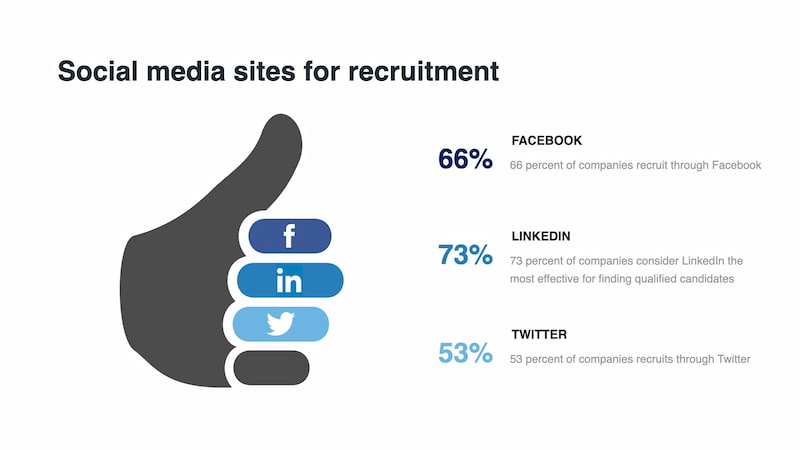
LinkedIn’s dominance in professional networking makes it the most critical platform for career-focused reputation management. With nearly three-quarters of companies viewing it as their most effective recruiting tool, LinkedIn optimization is essential for professional reputation management.
Up to 69% of job seekers reported they would reject a job offered by a company with a bad reputation, even when unemployed
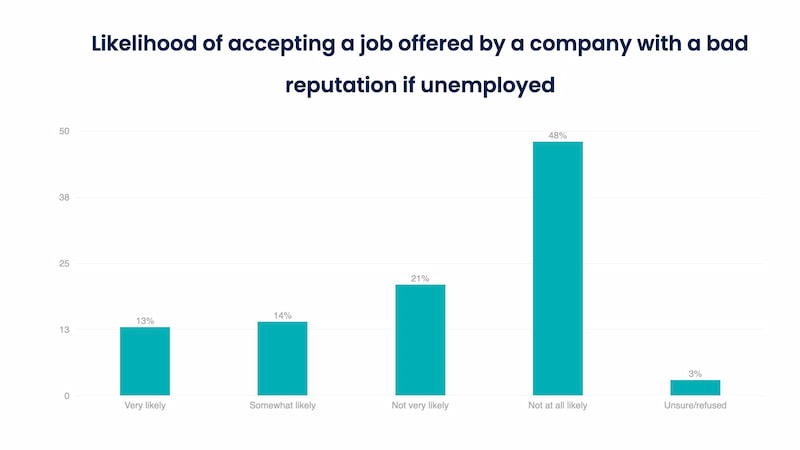
Company reputation affects recruitment in both directions. When 69% of job seekers would reject offers from companies with poor reputations—even when unemployed—it demonstrates that reputation management is crucial for talent acquisition.
If offered an increase in compensation of as much as 100%, 30% of the job seekers would still reject a job offer from a company with a bad reputation
The power of reputation over financial incentives is remarkable. When 30% of job seekers would reject a job offer from a poorly-reputed company even with doubled compensation, it shows that reputation damage can be more costly than significant salary increases.
Social Media Statistics
Social media platforms have become primary channels for reputation formation and management. Understanding social media’s role in reputation is essential for comprehensive reputation strategies.
The average consumer mentions brands 90 times per week
Brand mentions occur with remarkable frequency. With consumers mentioning brands 90 times per week on average, social media monitoring becomes essential for tracking reputation in real-time.
87% of people do comparative shopping for every purchase they make and shop on multiple channels
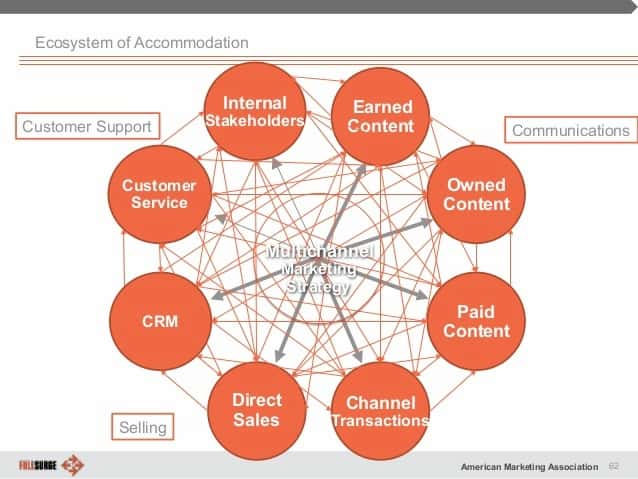
The research-intensive nature of modern consumer behavior means that reputation signals across multiple channels influence purchasing decisions. With 87% of people conducting comparative research, consistency across platforms becomes crucial.
The purchase decisions of 78% of consumers are influenced by social media posts
Social media’s direct impact on purchasing decisions makes it a critical reputation management channel. When 78% of consumers are influenced by social media posts, the content and sentiment on these platforms directly affect business outcomes.
75% of people use social media to research products
Social media has become a primary research tool. With 75% of people using social platforms for product research, maintaining positive social media presence is essential for reputation management.
71% of consumers who have had a positive experience with a brand on social media are likely to recommend the brand to their friends and family
Positive social media experiences create powerful word-of-mouth amplification. When 71% of consumers with positive social media brand experiences become advocates, social media reputation management becomes a customer acquisition strategy.
39% of customers only trust brands if they have interacted with them on social platforms
Social media interaction has become a trust prerequisite for many consumers. With 39% of customers requiring social media interaction before trusting a brand, passive social media presence is insufficient—active engagement is necessary.
76% of American consumers purchased a product after seeing a brand’s social post
The conversion power of social media content is substantial. When 76% of American consumers have made purchases based on social media posts, the quality and appeal of social media content directly impacts revenue.
Videos are the #1 branded content used by marketers
Video content dominates social media marketing strategies. Nearly 93% of marketers report acquiring customers through social media videos, making video content creation essential for social media reputation management.
86% of B2B organizations prefer LinkedIn for social media marketing, while 98% of B2C companies report using Facebook
Platform preferences vary significantly by business type. B2B companies focus on LinkedIn (86%), while B2C companies overwhelmingly use Facebook (98%), indicating that reputation management strategies must be tailored to target audience platforms.
66% of Gen-Z, 72% of millennials, 49% of Gen X, and 45% of baby boomers say social media impacts their buying decisions
Social media influence varies by generation but remains significant across all age groups. The highest influence among younger demographics (66-72%) compared to older groups (45-49%) suggests that social media’s importance in reputation management will continue to grow as younger consumers gain purchasing power.
63% of social media users expect brand response within one hour
Social media response expectations have intensified, with 63% of social media users now expecting a brand response within one hour. This expectation for rapid response requires businesses to maintain active social media monitoring and response capabilities. [Forbes, July 2024]
Corporate Social Responsibility Statistics
Corporate Social Responsibility (CSR) has become a significant factor in reputation management, with consumers increasingly evaluating companies based on their social and environmental commitments.
92% of consumers have a more positive image of companies that support social issues and environmental efforts
CSR initiatives create substantial reputation benefits. With 92% of consumers viewing companies more positively when they support social and environmental causes, CSR becomes a powerful reputation management tool.
63% of the public would give socially responsible businesses the benefit of the doubt during a crisis
CSR creates reputation resilience. When 63% of the public extends benefit of the doubt to socially responsible companies during crises, CSR investments provide reputation insurance during difficult periods.
87% will purchase a product because a company advocated for an issue they cared about
Issue advocacy drives purchasing behavior. With 87% of consumers willing to purchase products from companies that advocate for causes they support, CSR becomes a direct revenue driver.
66% of consumers are willing to pay extra to patronize companies that are committed to CSR
CSR commands premium pricing. When 66% of consumers will pay extra for products from CSR-committed companies, social responsibility becomes a competitive advantage that supports higher margins.
3.2X increase in trust when a company’s reputation score goes from average to excellent
The trust multiplier effect of excellent reputation is substantial. A 3.2x increase in trust when moving from average to excellent reputation demonstrates the exponential returns of reputation investment.
83% of consumers reported trustworthiness being the emotional factor that’s most aligned with their favorite brands
Trust dominates brand affinity. With 83% of consumers identifying trustworthiness as the primary emotional factor in brand preference, reputation management becomes fundamental to customer loyalty.
62% of consumers said a company’s reputation is very important when considering their products
Reputation directly influences purchase consideration. With 62% of consumers rating company reputation as very important in product consideration, reputation management becomes a sales enablement tool.
Cybersecurity Statistics
Cybersecurity incidents can severely damage reputation, making security a critical component of reputation management strategies.
More than 75% of attacks are initiated by email
Email remains the primary attack vector for cybercriminals. With over 75% of attacks originating from email, email security becomes essential for reputation protection.
Most consumers have experienced cybercrime, with around one in three reporting cybercrime in 2020
Cybercrime’s prevalence makes consumers increasingly security-conscious. With one in three consumers experiencing cybercrime, security reputation becomes a competitive differentiator.
The FBI received more than 2,000 cybercrime complaints daily in 2020
The scale of cybercrime continues to grow. With over 2,000 daily complaints to the FBI, cybersecurity incidents that damage reputation occur with alarming frequency.
The healthcare industry expects to spend nearly $125 billion on costs related to cybersecurity between 2020 and 2025
Industry-specific cybersecurity investments reflect reputation risks. Healthcare’s $125 billion cybersecurity investment over five years demonstrates how reputation protection drives security spending.
58% of adults are more worried than ever about being a victim of cybercrime
Consumer anxiety about cybersecurity affects brand trust. With 58% of adults increasingly worried about cybercrime, companies with strong security reputations gain competitive advantages.
53% of adults say they are unsure how to protect themselves against cybercrime
Consumer security uncertainty creates opportunities for trusted brands. When 53% of adults feel uncertain about cybersecurity protection, companies that provide security guidance build trust and reputation.
41% of people don’t think their accounts are valuable enough to be worth a hacker’s time
Consumer underestimation of their value as targets creates security vulnerabilities. This misconception affects how consumers evaluate company security measures and reputation.
25% of adults have admitted to carelessly posting sensitive information about themselves on social media
The privacy-convenience trade-off affects reputation management strategies. With 60% of users prioritizing convenience over privacy, companies must balance security messaging with usability benefits.
Consumer security behaviors affect overall digital risk. When 25% of adults carelessly share sensitive information, the reputation risks extend beyond company-controlled channels.
Market Growth and Industry Outlook
The online reputation management software market demonstrates the growing importance of this field, expected to grow from $5.2 billion in 2024 to $14.02 billion by 2031, representing a compound annual growth rate of 13.2%. This substantial growth reflects increasing recognition of reputation management’s business value and the expanding digital landscape that requires monitoring and management. [PassiveSecrets, November 2024]
As digital interactions continue to proliferate and consumer expectations for brand responsiveness increase, the importance of systematic reputation management will only continue to grow. Companies that invest in comprehensive reputation management strategies today will be better positioned to thrive in an increasingly connected and transparent business environment.
Conclusion
These statistics paint a clear picture: online reputation management is not optional in today’s digital business environment. From search engine dominance to social media influence, from review impact to employment implications, reputation affects every aspect of business success.
The data shows that consumers trust online information, make decisions based on digital signals, and expect rapid, authentic responses from brands. Companies that understand and act on these statistics will build stronger reputations, while those that ignore them risk significant competitive disadvantages.
As AI continues to reshape the digital landscape and new generations of consumers bring different expectations and behaviors, staying current with reputation management statistics and trends becomes essential for business success. The investment in reputation management is not just about protecting against negative outcomes—it’s about building the trust and credibility that drive sustainable business growth.
About the author
Kent Campbell is the chief strategist for Reputation X, an award-winning online reputation management agency. He has over 15 years of experience with SEO, Wikipedia editing, review management, and online reputation strategy. Kent has helped celebrities, leaders, executives, and marketing professionals improve the way they are seen online. Kent writes about reputation, SEO, Wikipedia, and PR-related topics, and is an expert witness for reputation-related legal matters.
–
